Navigating Senior Care Options with Always Best Care in Milwaukee

Understanding and selecting the perfect senior care options is paramount to ensuring your loved ones receive the care they need later in life.
In Milwaukee, Always Best Care stands as a beacon of support, offering comprehensive and tailored services to meet the unique needs of every senior.
This guide dives deep into the various aspects of senior care, helping families make informed decisions for their aging relatives.
Table of Contents
What Are the Different Types of Available Senior Care?

Senior care encompasses a range of services designed to support the elderly in different stages of their lives. At Always Best Care, we provide:
- In-home care: Allows seniors to stay in their familiar environment with tailored assistance.
- Assisted living: Combines housing, support services, and health care as needed.
- Nursing homes: For seniors who require 24-hour medical attention.
- Memory care: Specialized care for seniors with Alzheimer’s and other forms of dementia.
- Respite care: Temporary relief for those who care for family members, which can be scheduled regularly or on an emergency basis.
How to Determine the Right Level of Care for Your Loved One
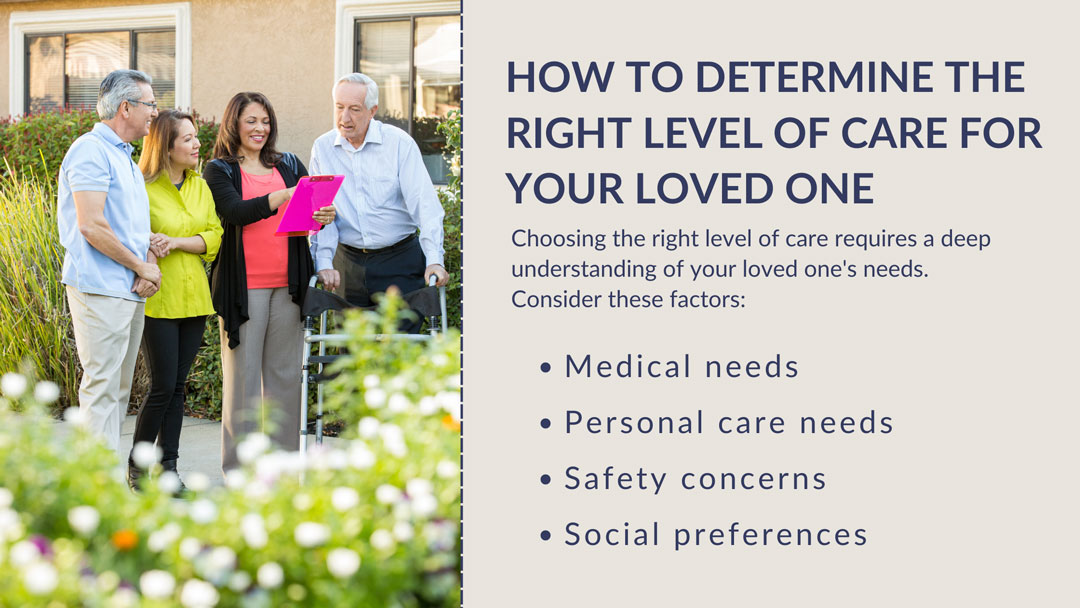
Choosing the right level of care requires a deep understanding of your loved one’s needs. Consider these factors:
- Medical needs: What are the ongoing medical treatments required?
- Personal care needs: How much help does your loved one need with daily activities?
- Safety concerns: Are there cognitive issues that might require more supervised care?
- Social preferences: Does your loved one thrive on social interaction or prefer privacy?
5 Services Included in Home Care
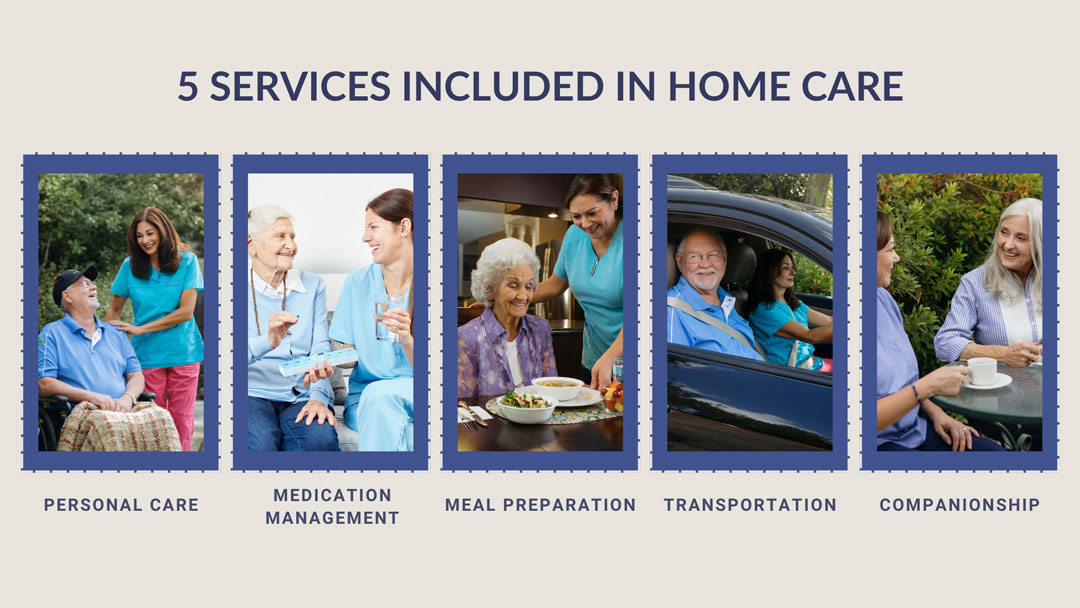
Home care services from Always Best Care include:
- Personal care: Assistance with bathing, dressing, and grooming.
- Medication management: Ensuring medications are taken on time and managing prescriptions.
- Meal preparation: Nutritious meal planning and cooking tailored to dietary needs.
- Transportation: To appointments, social events, and more.
- Companionship: Engaging seniors in activities that keep them mentally and physically active.
How Does Always Best Care Tailor Home Care Services to Unique Needs?
Each senior has unique needs and preferences. Always Best Care Milwaukee employs a thorough assessment process to understand these needs and match them with the right caregivers. Tailored care plans ensure that each senior’s preferences and health requirements are addressed.
What Are the Benefits of Home Care for Seniors?
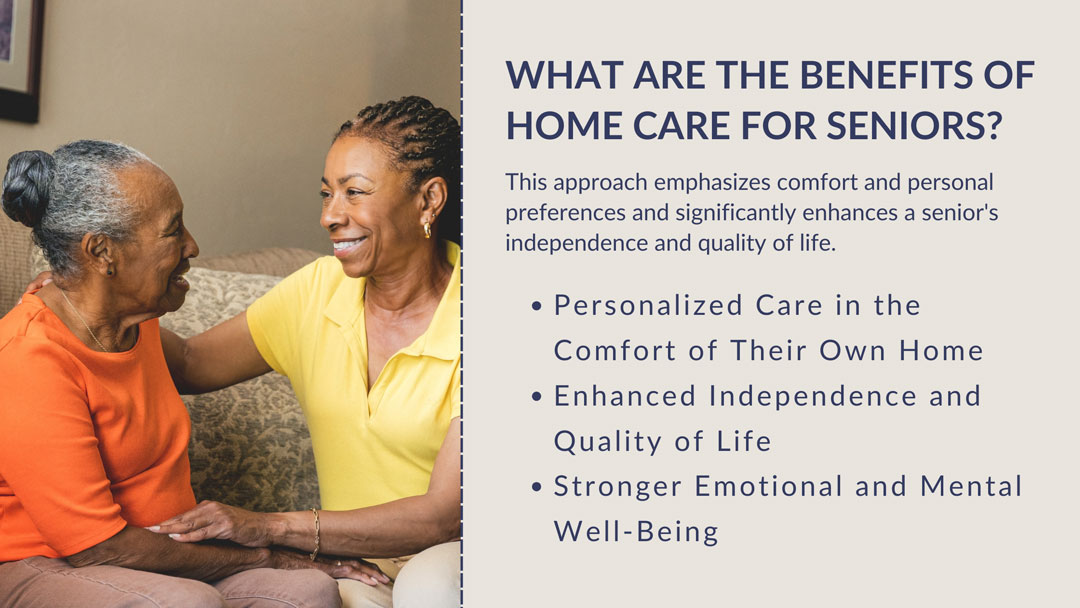
Home care provides seniors the invaluable benefit of receiving tailored, personal support in the familiar environment of their own homes. This approach emphasizes comfort and personal preferences and significantly enhances a senior’s independence and quality of life.
Home care enables seniors to continue living safely and comfortably by assisting with daily tasks and offering specialized care.
Here’s a closer look at these advantages:
Personalized Care in the Comfort of Their Own Home
Home care is deeply personalized. It’s all about creating a care plan that fits perfectly with a senior’s lifestyle and needs right in their home. This means everything from the kind of help provided to when it’s provided is tailored to suit individual preferences, habits, and schedules.
Care that adapts to personal routines, rather than adjusting to a care facility’s schedules, can make a huge difference in a senior’s comfort and satisfaction.
Enhanced Independence and Quality of Life
One of the top priorities of home care is to support seniors in maintaining their independence as much as possible. This is done by assisting them with daily tasks that might have become challenging, thereby allowing them to continue living on their own terms.
Whether it’s help with gardening, managing medications, or getting around town, this support lets seniors continue enjoying their hobbies and routines, which is crucial for their sense of autonomy and enhances their quality of life.
Stronger Emotional and Mental Well-Being
Staying in a familiar environment can significantly affect a senior’s emotional and mental health. The comfort of home, filled with personal memories and a sense of belonging, can help alleviate stress or disorientation that might come with moving to a new place.
Home care often includes companionship from caregivers who provide emotional support and social interaction, which is vital for maintaining mental health and preventing feelings of isolation and loneliness.
What Safety Measures Are in Place for Home Care Services?
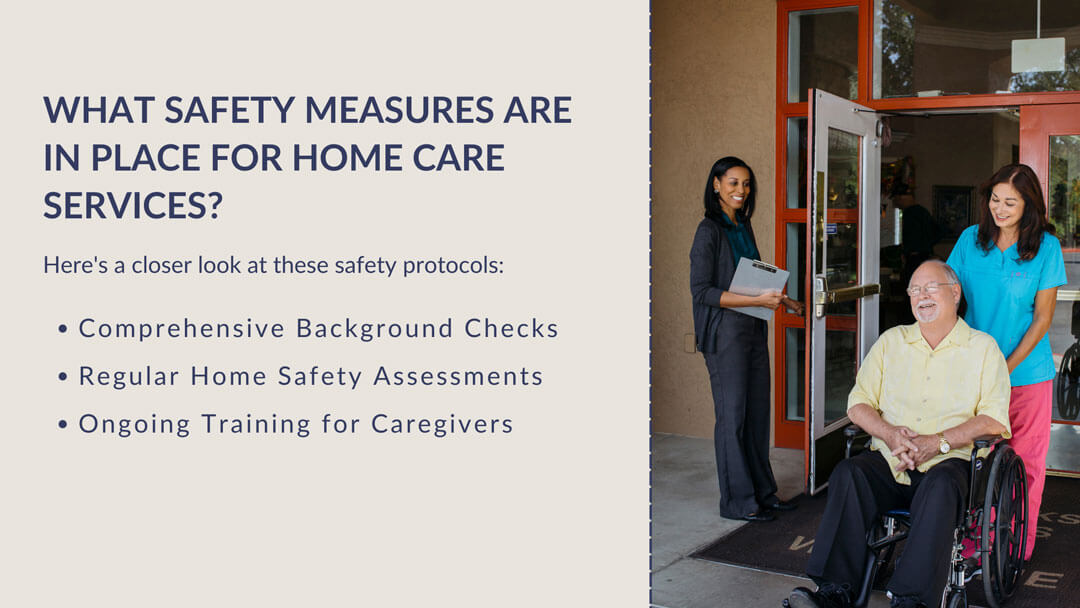
Ensuring the safety and well-being of seniors receiving home care is a top priority. Several key safety measures are implemented in a variety of situations to maintain a secure and supportive environment for the elderly and their caregivers. Here’s a closer look at these safety protocols:
Comprehensive Background Checks
Before caregivers can begin working with clients, they must undergo thorough background checks. This includes criminal record checks, verification of qualifications, and reference checks from previous employment.
These comprehensive background checks help ensure that only trustworthy and qualified individuals are employed to provide care, ensuring the safety and security of seniors in their homes.
Regular Home Safety Assessments
Regular home safety assessments are conducted to enhance seniors’ safety further. These assessments are designed to identify potential hazards in the home, such as loose carpets, inadequate lighting, or unsafe furniture arrangements.
Recommendations are then made to eliminate these risks, which may involve minor home modifications or the addition of safety features like grab bars in the bathroom or non-slip mats in slippery areas.
Ongoing Training for Caregivers
Continuous training for caregivers is another crucial aspect of maintaining high safety standards. This training includes updates on best practices in elderly care, emergency response procedures, and the latest health and safety regulations.
Caregivers also receive specific training on handling the unique needs of their clients, such as managing mobility issues or administering medication properly, ensuring they are well-prepared to address any situation that may arise.
What Are the Costs Associated with Home Care?
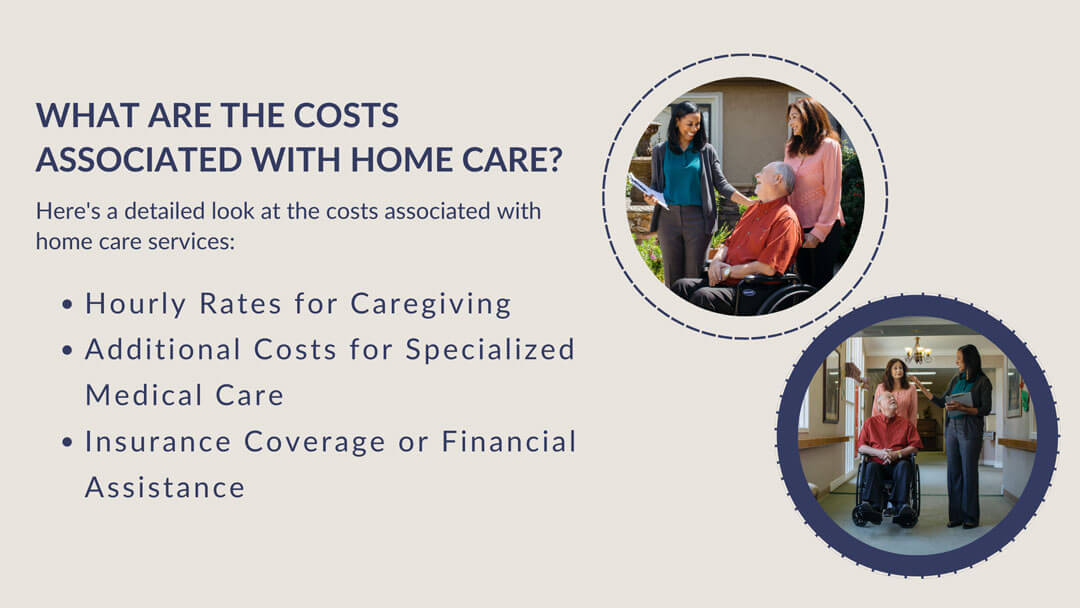
Home care costs for seniors can vary significantly based on the type and frequency of services required. Typically, these expenses are calculated hourly, with rates influenced by the level of care needed, from essential daily living support to more complex medical assistance.
Here’s a detailed look at the costs associated with home care services:
Hourly Rates for Caregiving
The costs of home care are often calculated on an hourly basis. These rates can vary widely depending on the level of care required, the expertise of the caregiver, and the geographic location.
Basic assistance with daily activities like cooking, cleaning, and personal care typically costs less than more specialized medical or nursing care. Families should evaluate the number of daily or weekly hours of care their loved one will need to estimate the overall cost-effectiveness.
Additional Costs for Specialized Medical Care
If a senior requires specialized medical care, such as physical therapy, wound care, or management of chronic conditions, the costs can be higher.
These services often require professionals with specific medical training and certifications, which can influence the overall expenses. Considering these potential additional costs when planning for home care is important.
Insurance Coverage or Financial Assistance
Many families can access various financial assistance to help cover home care costs. This might include private health insurance, Medicare, or Medicaid, depending on the services required and the senior’s eligibility. Some regions also offer additional programs or subsidies for senior care.
It’s beneficial for families to explore all available insurance and assistance options to alleviate the financial burden of home care. Understanding these cost components will help families better plan and manage the expenses related to providing home care for their elderly loved ones, ensuring they receive the necessary support in a financially sustainable way.
How Can Families Stay Involved in Home Care Planning?
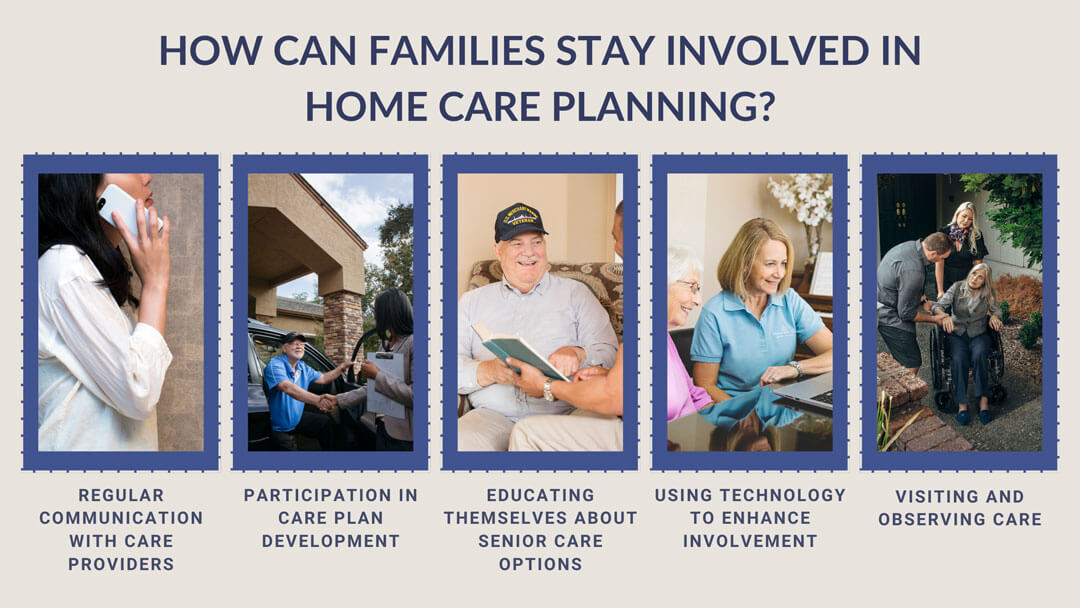
Staying actively involved in the planning and managing of home care is crucial for families who want to ensure their elderly loved ones receive the best possible support. Here are some strategies to help families maintain a hands-on approach:
Regular Communication with Care Providers
Maintaining open lines of communication with caregivers and care managers is essential. Families should schedule regular updates and meetings to discuss the senior’s health, progress, and any changes in their care plan. This ensures that the care remains appropriate as the senior’s needs evolve and allows for immediate adjustments if necessary.
Participation in Care Plan Development
Families should be actively involved in the initial development of the care plan. This includes working with healthcare professionals to assess their loved one’s needs and agreeing on the goals and methods of care. By contributing to this process, families can ensure that the care plan reflects their loved one’s true needs and preferences.
Educating Themselves About Senior Care Options
It’s beneficial for family members to educate themselves about the different aspects of senior care. Understanding the various services available and the legal and health considerations involved can empower families to make informed decisions and advocate effectively for their loved one’s needs.
Using Technology to Enhance Involvement
Technology can play a significant role in helping families stay involved in home care. From digital health records and monitoring systems to communication platforms that facilitate updates and meetings, technology can bridge the gap between families, seniors, and caregivers, ensuring everyone stays informed and engaged.
Visiting and Observing Care
Whenever possible, family members should visit their loved ones regularly and observe the care they are receiving. These visits provide emotional support to the senior and allow families to see firsthand how the care is being administered and interact directly with caregivers.
By staying involved through these methods, families can play an integral role in home care, ensuring that their elderly relatives receive compassionate, appropriate, and effective care tailored to their needs.
Find the Perfect Care Solution for Your Loved One with Always Best Care Milwaukee!
Choosing the right care for your loved one is a crucial decision. With Always Best Care Milwaukee, located at 16869 W Greenfield Ave, New Berlin, WI 53151, you have a dedicated partner in senior care. We ensure your loved one receives the best care suited to their needs while maintaining dignity and independence. For more information, contact us at (262) 668-8139 and experience the exceptional care we provide.





